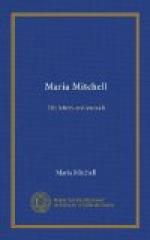Conceiving that the correspondence could be carried on more promptly through the Danish legation at Washington, I addressed a letter on the 20th of April to Mr. Steene-Bille, Charge d’Affaires of the king of Denmark in this country, and sent with it copies of the documents which had been forwarded to Professor Schumacher. Mr. Steene-Bille, however, was of opinion that the application, if made at all, should be made through the American legation at Copenhagen; but he expressed at the same time a confident opinion that, owing to the condition and political relations of Denmark, the application would necessarily prove unavailing.
It was at this time that the difficulties in Schleswig-Holstein were at their height, and it seemed hopeless at such a moment, and in face of the opinion of the official representative of the Danish government in this country, to engage its attention to an affair of this kind. No further attempt was accordingly made by me, for some weeks, to pursue the matter. In fact, a report reached the United States that the medal had actually been awarded to Father de Vico. Although this was believed by me to be an unfounded rumor, the regulations allowing one year for the presentation of claims, there was reason to apprehend that it proceeded from some quarter well informed as to what would probably take place at the expiration of the twelvemonth.
On the 5th of August, Father de Vico, who had left Rome in the spring in consequence of the troubles there, made a visit to Cambridge, in company with the Right Rev. Bishop Fitzpatrick, of Boston, and on this occasion informed me that he had received an intimation from Professor Schumacher that the comet-medal would be awarded to Miss Mitchell. I was disposed to think that Father de Vico labored under some misapprehension as to the purport of Professor Schumacher’s communications, as afterwards appeared to be the case. I felt encouraged, however, by his statement not only to renew my correspondence on the subject with Professor Schumacher, but I determined, on the 8th of August, to address a letter to R.P. Fleniken, Esq., Charge d’Affaires of the United States at Copenhagen. This letter was accompanied with copies of the original papers.
Mr. Fleniken entered with great zeal and interest into the subject. He lost no time in bringing it before the Danish government by means of a letter to the Count de Knuth, the Minister at that time for Foreign Affairs, and of another to the king of Denmark himself. His Majesty, with the most obliging promptness, ordered a reference of the case to Professor Schumacher, with directions to report thereon without delay. Mr. Schumacher had been for a long time in possession of the documents establishing Miss Mitchell’s priority, which was, indeed, admitted throughout scientific Europe. Professor Schumacher immediately made his report in favor of granting the medal to Miss Mitchell, and this report was accepted by the king. The result was forthwith communicated by the Count de Knuth to Mr. Fleniken, with the gratifying intelligence that the king had ordered the medal to be awarded to Miss Mitchell, and that it would be delivered to him for transmission as soon as it could be struck off. This has since been done.




